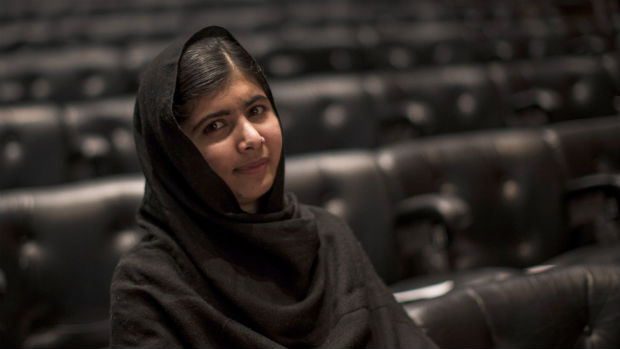Malala Yousafzai and Kailash Satyarthi win Nobel peace prize
Pakistani schoolgirl Malala, who was shot by the Taliban and has campaigned on girls' education, has won the Nobel peace prize

A free daily email with the biggest news stories of the day – and the best features from TheWeek.com
You are now subscribed
Your newsletter sign-up was successful
The Nobel peace prize has been jointly awarded to Pakistani child education activist Malala Yousafzai and Indian child rights activist Kailash Satyarthi.
At 17, Yousafzai becomes the youngest ever winner of the prize.
The schoolgirl campaigner was shot in the head by the Taliban in 2012, but survived the attack and was brought with her family to the UK. Once she had recovered, she went back to school and went on to advocate for better rights for girls. Yousafzai has since become "a worldwide symbol for the fight against oppression on women", the International Business Times says.
The Week
Escape your echo chamber. Get the facts behind the news, plus analysis from multiple perspectives.

Sign up for The Week's Free Newsletters
From our morning news briefing to a weekly Good News Newsletter, get the best of The Week delivered directly to your inbox.
From our morning news briefing to a weekly Good News Newsletter, get the best of The Week delivered directly to your inbox.
The other winner, Satyarthi, has "maintained the tradition of Mahatma Gandhi", the Nobel committee said, by leading a range of peaceful protests "focusing on the grave exploitation of children for financial gain".
The committee said the pair were awarded the prize "for their struggle against the suppression of children and young people".
Yousafzai had been the favourite to win last year's Nobel prize, which was instead awarded to an anti-chemical weapon charity.
Norway's prime minister, Erna Solberg, became the first world leader to tweet her congratulations, The Guardian reports.
A free daily email with the biggest news stories of the day – and the best features from TheWeek.com
Nobel Peace Prize awarded to Kailash Satyarthi and @Malala Yousafzai for their important work to secure education for children. Congrats! — Erna Solberg (@erna_solberg) October 10, 2014
Yousafzai and Satyarthi claimed the prize jointly ahead of a record number of 278 nominees which included Pope Francis and the Congolese gynaecologist Denis Mukwege. The full list of nominees was kept secret, the BBC says.
Some news outlets had suggested that whistleblower Edward Snowden had also been in the running for the prize, after the former CIA administrator leaked classified documents on a number of global surveillance programs, which fuelled the debates about government surveillance and secrecy.
Explaining their decision to award the prize to Yousafzai, the Nobel committee said "Despite her youth, Malala Yousafzai has already fought for several years for the right of girls to education, and has shown by example that children and young people, too, can contribute to improving their own situations.
"This she has done under the most dangerous circumstances. Through her heroic struggle she has become a leading spokesperson for girls' rights to education."
Previous winners of the prize include Nelson Mandela, Martin Luther King, and Aung San Suu Kyi. But the prize is not without controversy. In 2009 Barack Obama was a peace prize winner when his presidency was still in its infancy. The following year, the prize was awarded to Chinese dissident and political prisoner Liu Xiaobo, leading China to sever diplomatic and trade ties with Norway.
Nobel prizes are handed to their winners each year on 10 December to commemorate the anniversary of prize founder Alfred Nobel's death in 1896. Each laureate is given 8m kronor (£690,000), a diploma and a gold medal.
Nobel, a Swedish industrialist, said that the peace prize should reward those who "have conferred the greatest benefit to mankind".
-
 The ‘ravenous’ demand for Cornish minerals
The ‘ravenous’ demand for Cornish mineralsUnder the Radar Growing need for critical minerals to power tech has intensified ‘appetite’ for lithium, which could be a ‘huge boon’ for local economy
-
 Why are election experts taking Trump’s midterm threats seriously?
Why are election experts taking Trump’s midterm threats seriously?IN THE SPOTLIGHT As the president muses about polling place deployments and a centralized electoral system aimed at one-party control, lawmakers are taking this administration at its word
-
 ‘Restaurateurs have become millionaires’
‘Restaurateurs have become millionaires’Instant Opinion Opinion, comment and editorials of the day
-
 Epstein files topple law CEO, roil UK government
Epstein files topple law CEO, roil UK governmentSpeed Read Peter Mandelson, Britain’s former ambassador to the US, is caught up in the scandal
-
 Iran and US prepare to meet after skirmishes
Iran and US prepare to meet after skirmishesSpeed Read The incident comes amid heightened tensions in the Middle East
-
 Israel retrieves final hostage’s body from Gaza
Israel retrieves final hostage’s body from GazaSpeed Read The 24-year-old police officer was killed during the initial Hamas attack
-
 China’s Xi targets top general in growing purge
China’s Xi targets top general in growing purgeSpeed Read Zhang Youxia is being investigated over ‘grave violations’ of the law
-
 Panama and Canada are negotiating over a crucial copper mine
Panama and Canada are negotiating over a crucial copper mineIn the Spotlight Panama is set to make a final decision on the mine this summer
-
 Why Greenland’s natural resources are nearly impossible to mine
Why Greenland’s natural resources are nearly impossible to mineThe Explainer The country’s natural landscape makes the task extremely difficult
-
 Iran cuts internet as protests escalate
Iran cuts internet as protests escalateSpeed Reada Government buildings across the country have been set on fire
-
 US nabs ‘shadow’ tanker claimed by Russia
US nabs ‘shadow’ tanker claimed by RussiaSpeed Read The ship was one of two vessels seized by the US military